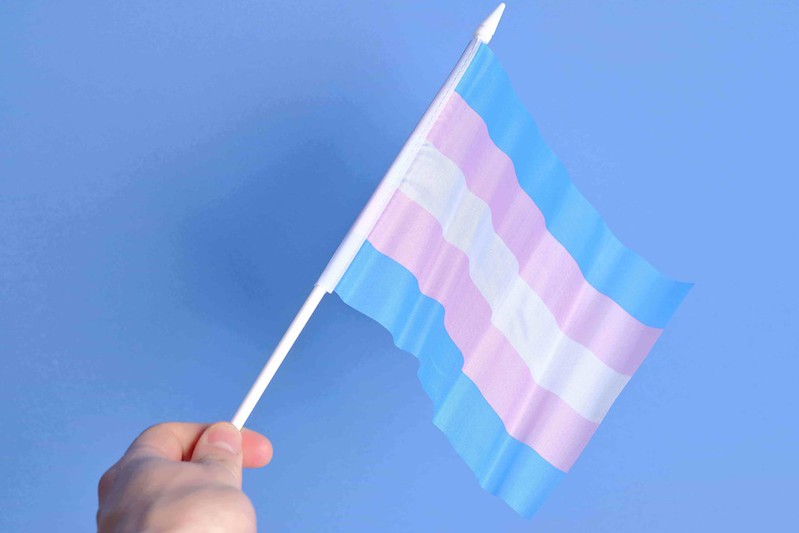Image courtesy of Focal Foto; CC-BY-NC 2.0 DEED.
On January 24, 2024, Ohio legislatures banned gender-affirming care for minors, overriding Republican Governor Mike De Wine’s veto of the bill in December 2023.1 The law banning gender-affirming care, proposed by state representative Gary Click (R), will prevent families of trans youths (up to age 18) from accessing vital treatments and services such as puberty blockers and hormone therapy.1 Republican lawmakers claim that the law will ‘protect’ children, stating that gender-affirming care causes harm to children. However, these lawmakers have failed to acknowledge the benefits of gender-affirming care. This proposed law infringes upon the rights of transgender persons and the rights of parents/guardians to make safe, well-informed decisions on their child’s behalf. This law will harm transgender and gender diverse youths who live in Ohio and those who travel to Ohio for gender-affirming care due to anti-trans legislation that exists in their home state.1
2024 marks the start and effective dates of many anti-LGBTQ+ and anti-trans laws across the U.S. that were proposed in 2023.2 Almost half of the states across the country have passed laws targeting transgender people, most of which attempt to ban or restrict access to gender-affirming care for youths.1 Most states have banned/restricted gender-affirming care for individuals who are under the age of 18, while some states, such as Oklahoma, Texas, and South Carolina, have banned/restricted care for transgender individuals up to the age of 26.3 In 2023, five states –Oklahoma, Idaho, Florida, Alabama, and North Dakota–viewed providing gender-affirming care to minors as a felony.2 As more states ban and restrict access to gender-affirming care we can expect to see a sharp decline in physical, social, and mental health and well-being in gender-diverse youth populations.
The American Medical Association, American Academy of Pediatrics, American Psychiatric Association, and the American Academy of Child & Adolescent Psychiatry have stated that gender-affirming care for trans and nonbinary youths is medically necessary and appropriate for positive health outcomes. Gender-affirming care is evidence-based care that uses a multidisciplinary approach to help individuals transition from their assigned gender at birth to the gender they want to be known by.4 Gender-affirming services include mental health counseling, non-medical social transition, gender-affirming hormone therapy, and/or gender-affirming surgeries.5 Evidence has shown that forgoing gender-affirming care can have negative consequences. Gender-diverse individuals are three times more likely than the general population to be diagnosed with mental health disorders.5 Due to minority stress, chronic stress caused by social stigma, and discrimination based on gender identity and expression, gender-diverse individuals are more likely to develop substance use disorders and face a significantly heightened risk of suicide.5
Access to evidence-based gender-affirming care is necessary to ensure a happy, healthy, and fulfilling life for gender-diverse youths. Research suggests that improved body satisfaction and self-esteem followed by gender-affirming care improves mental health outcomes and social relationships for gender-diverse youths.5 In addition, research has shown that gender-diverse youths who utilize gender-affirming care are less likely to attempt suicide.5 In states where gender-affirming care is banned or restricted, gender-diverse youths are at a heightened risk of seeking dangerous and unsupervised medical and gender-affirming care, such as self-prescribed hormones.5
Healthcare can be loosely defined as any and all efforts made to maintain, restore, or promote a person’s physical, mental, and/or emotional well-being.6 Gender-affirming care fits under this definition, as studies have shown that gender-affirming care promotes the physical, mental, and emotional well-being of gender-diverse youths. Anti-trans and anti-LGBTQ+ legislation that target gender-affirming care are by-products of the nation’s failure to ensure universal and equitable access to healthcare. Promoting access and availability of gender-affirming care is a sure way of improving the health and well-being of gender-diverse youths. 2023 was a record shattering year for anti-LGBTQ+ legislation.7 The upcoming 2024 presidential election poses a threat to the rights, health, and safety of LGBTQ+ individuals. As the political landscape in the U.S. continues to change, it is essential to support and protect LGBTQ+ rights.
There are several resources you can access and use to support LGBTQ+ individuals. The American Civil Liberties Union (ACLU) works at national and state levels to support and protect the rights of people nationwide. GLAAD and Them also provide various resources, advocacy, and fundraiser groups across the U.S. that you can support.
Sources
- Ohio bans gender-affirming care for minors, overriding governor’s veto – The Washington Post
- 19 states have laws restricting gender-affirming care, some with the possibility of a felony charge | CNN Politics
- Map: Attacks on Gender Affirming Care by State – Human Rights Campaign (hrc.org)
- What is gender-affirming care? | CNN
- AMA to states: Stop interfering in health care of transgender children | American Medical Association (ama-assn.org)
- Health care Definition & Meaning – Merriam-Webster
- Record number of anti-LGBTQ legislation filed in 2023 – ABC News (go.com)


